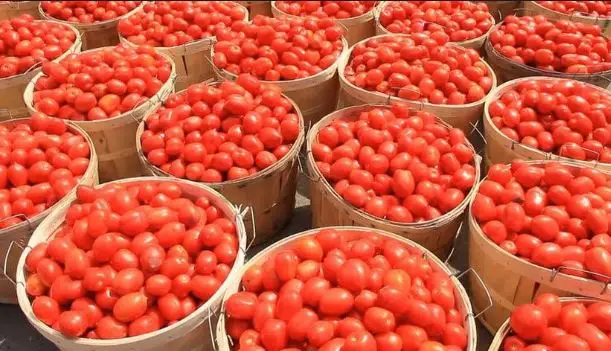There seems to be respite for Nigerians in the reduction of high tomato prices, as the Tomatoes and Orchard Producers Association of Nigeria, TOPAN, assured that current high tomato prices will crash this July following significant harvest from Plateau State, a major tomato producing State in the country.
Speaking during an interview with Vanguard, the National President, TOPAN, Oyeleke Bola, gave the assurance while speaking on factors that led to high prices of tomato across the country.
According to Bola, the late rainfalls was a major causative factor, which was later compounded by tuta absoluta also called tomato ebola, whereby farmers in Kano bore the huge brunt of it, therefore, the prices skyrocketed unabatedly.
The best month to plant tomatoes in Nigeria is between December and March. Planting tomatoes in the months of December, January, February and March will enable harvesting the commodity in the lean months of May – August. During the months of May to August, the prices of tomatoes reach their maximum level.
He said, “Small-scale farmers and the association had a lot of challenges in 2024. First of all, the climate is not favourable to us because the rain came late, and the first rain generated serious heat from the ground, which destroyed almost one hectare of land that tomato was cultivated in Kano State, and other parts of the country.
“As we were trying to address this challenge there was an outbreak of tomato ebola, also called tuta absoluta, and it caused a serious damaging impact on our tomatoes, and it was really serious that adversely affected our investments on tomatoes, which made it difficult for farmers to cope with.
“However, now we have tomato harvest in Plateau State, which can go around a little, at least to crash the prices of tomatoes in the market. Again we are trying to have a good land preparation before we start the wet season farming, however, planting this year too is late but we are trying to see what we can do because small-scale farms made a lot of losses during the dry season farming.
“Another challenge is the high cost of transportation, and this is really affecting the current tomato price in the market but with the coming in with the new harvest into major cities like Lagos, Abuja, Port Harcourt, and others at least by the middle of July the high price of tomato will go down a little.”
He also said tomato farmers have learnt from their current experience on the weather challenge that adversely affected their production, therefore, they will adjust to ensure they do the needful before, during and after planting tomatoes.
Meanwhile, he said, all year round tomato production is a major solution to scarcity and high prices of tomato in the market, basically, when there is massive investment from the private sector, and if the government collaborates with the private sector.
“Yes, all year round tomato production is possible when the private sector and government come together, and also when there is deployment of technology in terms of land preparation, mechanization for small-scale farmers, and that will make us have three seasons of tomato production in the year.”
However, he said he is not of the school of thought for tomato farmers to embrace GMO tomato seeds, but it is important to improve the local tomato seeds and varieties.
“This will be a plus for us because we are talking about an increase in yield and industrialization. Why we are talking about GMO is because our yield is low, and we want to see how we feed ourselves and other African countries too.
“But we have local seeds that institutions like National Horticultural Research Institute, NIHORT, when it comes to seed, and they can improve on it, and it is going to give us a very good yield too so we can feed our population because our population is growing but with this yield we cannot produce enough to feed the population, hence we need more players in the value chain in terms of processing, and technology.”
On their demands, the tomato boss said, “We want the Minister of Agriculture and Food Security to create a Federal Department for Tomato Development in the Ministry that would focus basically on tomato production, in terms of seed development, deployment of technology, capacity building of farmers, extension services, building facilities for processing, storage and ensuring massive production all year round because among other horticultural commodities, tomato is what Nigerians consume daily.
“This will go a long way to tackle the challenges along the tomato value chain, and also investors can come in for investment on seeds, fertilizers, irrigation, processing, and others as well.”











